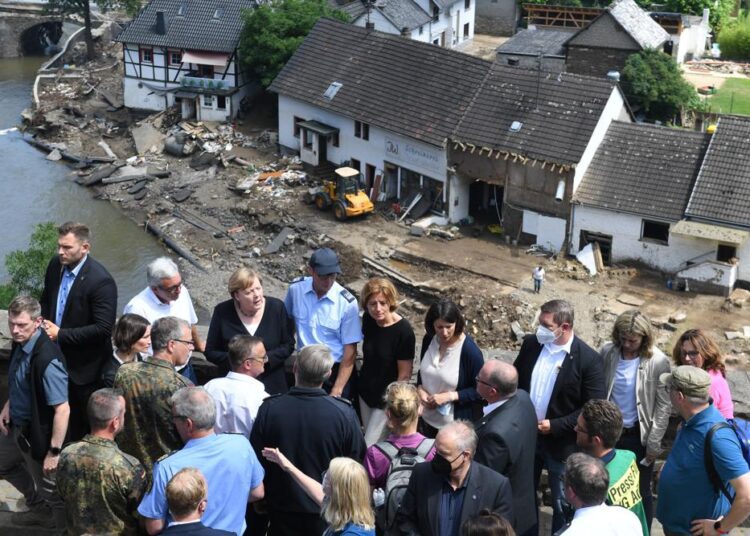BERLIN — German Chancellor Angela Merkel surveyed what she called a “surreal, ghostly” scene in a devastated village on Sunday, pledging quick financial aid and a redoubled political focus on curbing climate change as the death toll from floods in Western Europe climbed above 180, AP reported.
Merkel toured Schuld, a village on a tight curve of the Ahr River in western Germany where many buildings were damaged or destroyed by rapidly rising floodwaters Wednesday night.
Although the mayor of Schuld said no one was killed or injured there, many other places weren’t so lucky. The death toll in the Ahrweiler area, where Schuld is located, stood at 112. Authorities said some people are still missing and they fear the toll may still rise.
In neighboring North Rhine-Westphalia state, Germany’s most populous, 46 people were killed, including four firefighters. Belgium confirmed 27 deaths.
Merkel said she came away from Schuld, still partly strewn with rubble and mud in bright sunshine, with “a real picture of, I must say, the surreal, ghostly situation.”
“It is shocking — I would almost say that the German language barely has words for the devastation that has been wreaked,” she said at a news conference in a nearby town.
Merkel said authorities will work to “set the world right again in this beautiful region, step by step,” and her Cabinet will approve an immediate and medium-term financial aid program on Wednesday.
Finance Minister Olaf Scholz told the Bild am Sonntag newspaper that more than 300 million euros ($354 million) will be needed. And he said officials must set up a longer-term rebuilding program which, from experience with previous flooding, will be in the billions of euros.
“Thankfully, Germany is a country that can manage this financially,” said Merkel, who is stepping down as chancellor following an election in September. “Germany is a strong country and we will stand up to this force of nature in the short term — but also in the medium and long term, through policy that pays more regard to nature and the climate than we did in recent years. That will be necessary too.”
Climate scientists say the link between extreme weather and global warming is unmistakable and the urgency to do something about climate change undeniable.
Scientists can’t yet say for sure whether climate change caused the flooding, but they insist that it certainly exacerbates the extreme weather disasters on display around the world.
“We must get faster in the battle against climate change,” Merkel said, pointing to policies already set in motion by Germany and the European Union to cut greenhouse gas emissions. “And nevertheless, the second lesson is that we must pay great attention to adaptation” to climate change.
Investing in fighting climate change is expensive, she said, but failing to do so is even more costly.
“One flood isn’t the example of climate change, but if we look at the loss events of recent years, decades, then they are simply more frequent than they were previously — so we must make a great effort,” Merkel said.
Although the rain has stopped in the worst-affected areas of Germany, Belgium and the Netherlands, storms and downpours have persisted elsewhere in western and central Europe. There was flooding Saturday night in the German-Czech border area, in Germany’s southeastern corner, and over the border in Austria.
About 130 people were evacuated in Germany’s Berchtesgaden area after the Ache River swelled. At least one person was killed and the rail line to Berchtesgaden was closed.
The Berchtesgaden area also is the home of the sliding track in Koenigssee, the site of major international bobsled, skeleton and luge events for more than 50 years. Large segments of that track were destroyed, parts of the concrete chute turned into rubble by the rushing water.
The ground in the town remains unstable and several more houses could collapse. “We have to be careful with every step we take,” fire officer Olivier Jiust was quoted as saying.
Pope Francis prayed for the flood victims and in support of the “efforts of all to help those who suffered great damage.”
“I express my closeness to the populations of Germany, Belgium and Holland, hit by catastrophic flooding,” he said Sunday in his first public appearance to the faithful in St. Peter’s Square after major surgery. “May the Lord welcome the deceased and comfort the family members.”
Residents in the devastated areas will be needing support and comfort for a long time yet.
“This flood will leave scars on the people of Schuld — scars that you don’t forget, that can’t be overcome, because our lives changed from one day to the next,” Mayor Helmut Lussi said, breaking into sobs as he spoke.






Discussion about this post